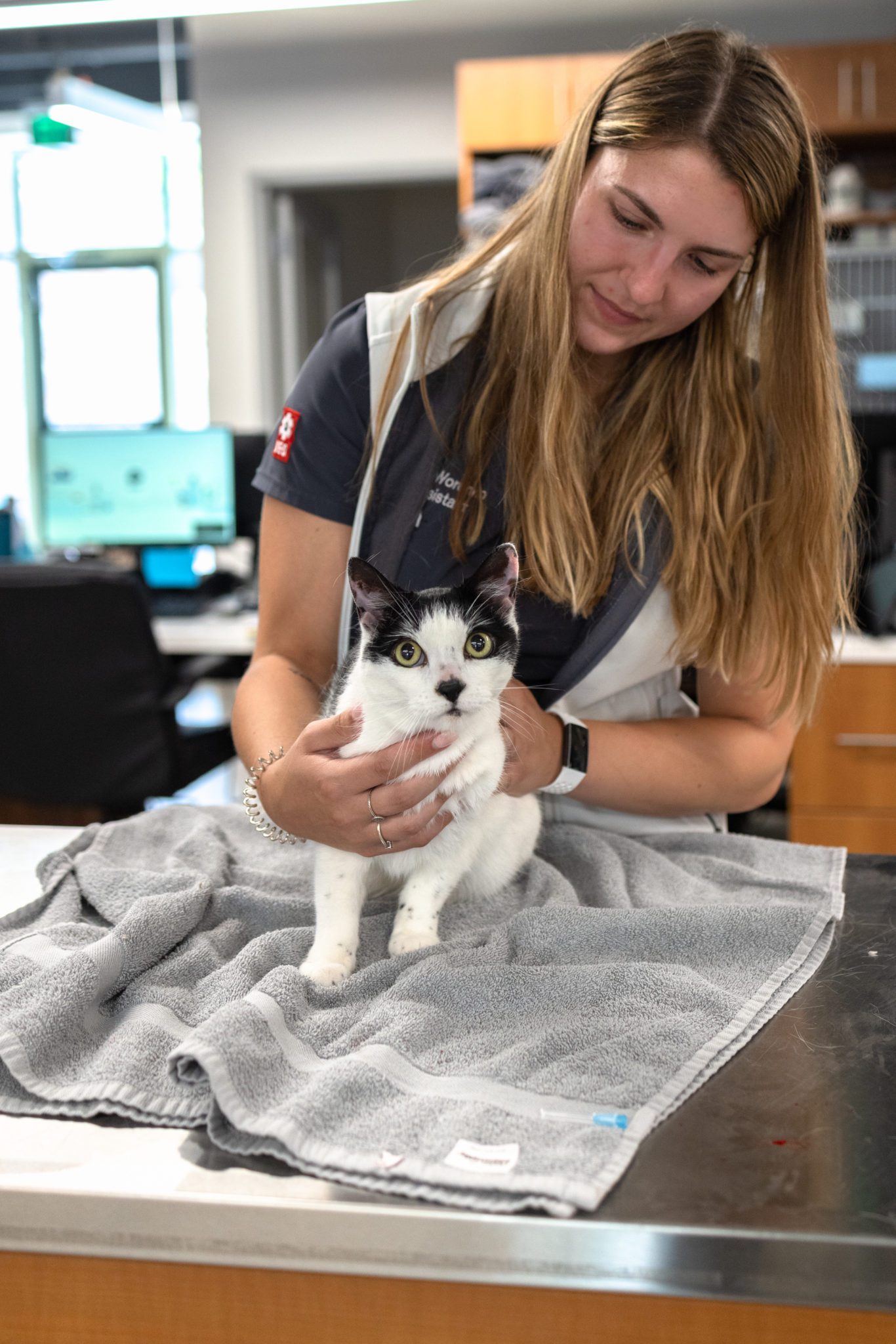
Why is My Cat Panting, and is This an Emergency?
Dr. Michael Rodgers
Call & Speak with a doctor Open 24/7, Even Holidays!
Walk in today for:
Emergencies
Point-of-Care Ultrasound
Urgent Care
X-Rays
Diagnostics + Testing
End-of-Life Care
Surgery
Treatment + Hospitalization
Pant, pant, pant. A sound commonly made by dogs…but it’s coming from your cat. Her tiny mouth is open and her kitty-cat chest is going up and down for what seems like a mile a minute. If you’re taken aback by your cat’s rapid breathing, you do have cause for concern.
Panting in felines isn’t common behavior the way it is with our canine friends. If your cat is panting, it means something’s up. Time to suss out the cause of her accelerated inhales and exhales so you can help your cat return to a calm, Sphinx-like state of mind.
WHAT DOES IT MEAN IF YOUR CAT IS PANTING?
If your cat is doing his best Darth Vader impersonation right now, that points to a potential problem. Best case scenario, there isn’t anything serious that’s causing the panting. It could be as simple as your cat’s super furry, and today is a hot day. But even if it’s not a huge deal, your cat’s panting needs to be managed because something’s off.
Panting in a cat could point to a medical issue in need of immediate attention. Let’s cover the possibilities and actions to take, if that’s the case.
First, try not to panic over panting. Your cat is clearly worked up and maybe isn’t “feline” so fine. If you can keep calm, you’ll help her return to being a chilled-out kitty.
Below, find some potential causes of panting in cats. This makes a good set of guidelines to help you decide if a trip to the emergency vet is in order, or if it’s simply a matter of helping her get comfortable.
CATS AND PANTING: 6 COMMON CAUSES
Causes for panting in cats include, but aren’t limited to the following:
1. Heat
On a scorching summer day, your cat feels the effects of high temperatures. I mean, look at her, dressed head-to-tail in a crazy cat-suit of fur! Panting isn’t your cat’s go-to for an instant cool-down the way it is with dogs. So if you see her doing it, she’s likely already dangerously overheated.
How to help your cat recover from being overheated:
Move her to a dark, cool room in your home with an air conditioner, a fan, or both. Let your cat rest and try to cool down. If your cat keeps on panting, take immediate action. Rapid and labored breathing signal heat stroke, so you don’t want to mess around. Take your cat to your nearest VEG ER for pets right away.
2. Pain or Stress
In some cases, panting points to pain in pets. Think of the last time you were in pain. You probably got sweaty, and your heart rate increased, right? Cats are the same way, but since they cannot sweat, they must pant instead. Could injury be the cause?
If you suspect your cat got into something and is now hurting, check her body thoroughly. Take note of any areas she seems to be guarding or defensive about. Mind her body language and behavior, too.
How to help your cat if she’s panting and in pain:
A small boo-boo, like a scratch on your cat’s ear or paw, might not require more than a little at-home first aid. But if your cat is panting, she could be in pain for some other reason like an internal problem. So call your primary care veterinarian or VEG.
3. Respiratory Illness
This could be the root of the issue if your cat is panting, wheezing, has a stuffy nose, is struggling to breathe, or showing other signs of illness.
Just like when a human catches a cold, cats can develop a range of respiratory symptoms that signal illness or infection, including cold or flu.
What to do if your cat is panting from a possible respiratory infection:
Concerned that your cat has a kitty-cold or feline flu? Visit your primary care vet or local VEG ER for pets. Your pet may need medication to resolve the symptoms and clear up any infection.
4. Asthma
“Squee… squee…” What’s that sound? Oh, it’s the cat, breathing like that! Not a situation to take lightly. Asthma is surprisingly common in cats. If left untreated, it causes lung inflammation and can lead to bouts of severe coughing that are difficult for felines to deal with.
When cats begin coughing hard, they may also pant as they try to breathe between the coughs. That’s the bad news for poor Wheezy. The good news is, asthma is fairly easily managed.
What to do if your cat is panting due to asthma:
If this is a first-time asthma attack, bring your cat to see a VEG emergency vet right away. Not being able to get air isn’t fun for anybody, and terribly scary for a feline who doesn’t understand what’s going on.
If your cat has already been diagnosed with asthma and now she’s panting, follow your primary care vet’s guidance for treating and managing asthma flare-ups. If the panting isn’t resolved or is getting worse, come to VEG for immediate help.
5. Heart Failure
Cats who suffer from congestive heart failure may pant as the disease progresses. With a worsening of congestive heart failure, fluid builds up around the heart and lungs, making it harder for cats to breathe.
Excessive panting due to heart failure is a tough thing for cat owners to witness. The cat may be panting because he or she is in pain during the final stages of this illness. Of course, you want your cat to be as comfortable as possible and free of pain, so speak with your primary care vet about compassionate options.
What to do if your cat’s panting could be related to heart failure:
Heart failure can sometimes be related to heartworm disease. If your cat is panting suddenly and does not have a diagnosis yet, treat it as an emergency and get to a VEG ER veterinarian.
6. Ingested or Inhaled Object
A few moments ago, Garfield was batting around a cat toy…now it’s in pieces, and he’s panting. Is this serious? Unfortunately, yes.
A swallowed object can become stuck in your cat’s throat or lodged in his airways. The good news is, if he’s panting, he’s still breathing. But that doesn’t make this any less of a serious situation.
Waste not a minute more if your cat swallowed a foreign object and is now panting. This is an emergency and requires a trip to the emergency vet.
CALL VEG ER FOR PETS RIGHT AWAY FOR YOUR CAT’S PANTING
Clearly, panting in your cat is something to be concerned about. Depending on the situation and your cat’s other symptoms, she could be at risk for a serious health problem. But it’s also possible that this isn’t anything to worry about.
If your cat is panting and seems to be showing any other signs of distress as well, take her to a VEG emergency vet right away. The sooner you respond to emergency situations with your cat, the more likely she will be to recover fully.
At VEG, we have compassionate and experienced veterinary team members available around the clock to help guide you in the best direction and provide the best care for your cat.
Call any of our locations to speak directly with an emergency veterinarian. Your concerns are our concerns, and within our open concept hospital, you’ll see all the veterinary heroics around you and know your cat is in good hands with our team of VEGgies. At VEG, you can stay with your pet the entire time, no waiting in a lobby, and even take part in your cat’s care. Breathing a sigh of relief? Purrrfect.

